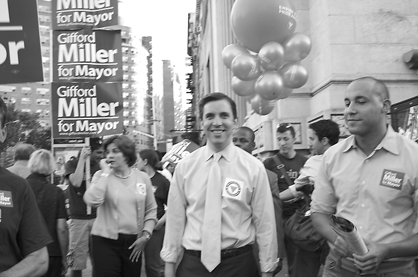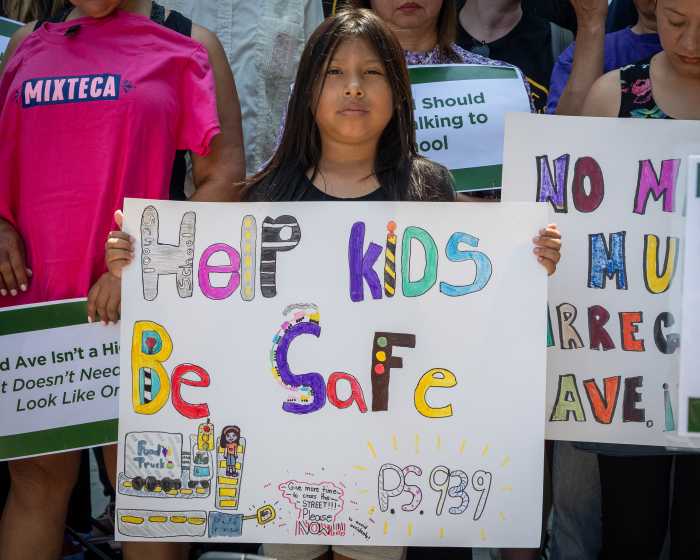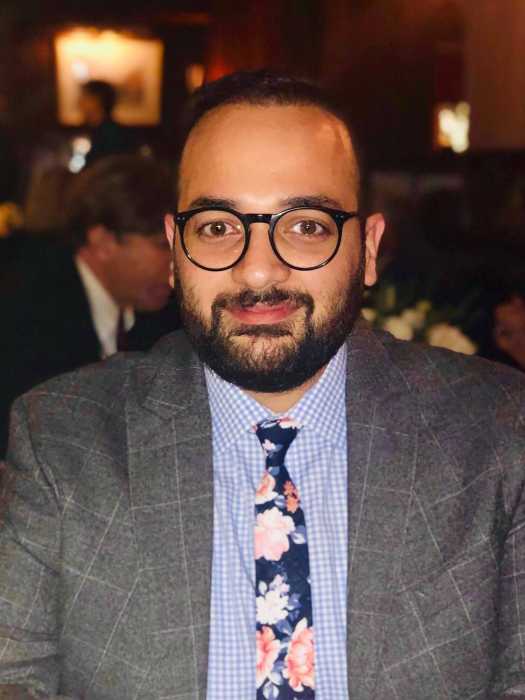Volume 75, Number 37 | September 15 – 21, 2005
POLITICS
Gay Support Fails Gifford Miller
Rosie Mendez is the big winner in this year’s LGBT game plan
In a mayoral primary campaign in which each of the four Democrats signed onto the major lesbian, gay, bisexual, and transgender political goals—opposing Republican Mayor Michael Bloomberg’s appeal of February’s pro-gay marriage ruling and supporting two measures he is blocking, a law guaranteeing that city contractors treat domestic partners and spouses of their employees equally and a measure providing anti-bullying protections in public schools—the irony was that the candidate most closely aligned with the community fared the worst.
City Council Speaker Gifford Miller was the best financed Democrat with the broadest range of endorsements citywide and he began an aggressive pursuit of the mayoralty long before his three opponents moved into high gear. He also snagged three of the major organizational endorsements in the LGBT community—from the Empire State Pride Agenda, the Gay and Lesbian Independent Democrats, and the Stonewall Democratic Club of New York City.
Yet, in the end, Miller, who as Council speaker, was the second most powerful figure in city government during the past four years and led the loyal opposition to the mayor, polled little more than 10 percent of the vote, placing him dead last among the major contenders. Even in Manhattan, which is full of gay and white liberal voters who were thought to be his natural constituency, Miller placed fourth.
In a somber campaign reception at Crobar, the Chelsea nightclub, Miller was joined by two of his most steadfast gay and lesbian supporters, State Senator Tom Duane and City Councilwoman Christine Quinn, with whom Miller plotted Council veto overrides on both the contractor and the bullying law. Quinn, who would like to succeed Miller as speaker come January, introduced the losing candidate with warm words, describing him as “someone I love dearly” and saying that in both personal and political terms, “There is no request I have made of Gifford Miller that he has not said yes to.”
For his part, in a brief and bittersweet concession speech, Miller named his work on behalf of the rights of same-sex couples as among his signature achievements as speaker, along with the earned income tax credit, the living wage bill, and new lead paint regulations. When he listed the organizations for whose support he was grateful, he mentioned first the Empire State Pride Agenda, before a host of other progressive and labor groups.
“I am so proud of the work you have put into this,” Miller told the crowd of fervent supporter, with a bit of moisture in his eyes and a catch in his throat. “It means more to me than I can tell you. I want each of you to know that I’ll never forget you. I never will.”
Elsewhere on Tuesday evening, Rosie Mendez guaranteed that at least one new lesbian councilwoman will join Quinn on the Council in January, with her convincing victory in a crowded Lower East District 2 race to succeed Margarita Lopez, one of three openly gay and lesbian members on the current Council. Term limits brought an end to her tenure as well as that of Philip Reed, who since 1998 represented portions of the Upper West Side, Harlem, and East Harlem.
Lopez failed in her bid for Manhattan borough president, a race won by Upper West Side state Assemblyman Scott Stringer, one of the sponsors of gay marriage legislation in Albany. Still, in a field of nine candidates with significant political expertise, Lopez finished third with 13 percent of the vote, followed by gay attorney Brian Ellner, a former community school board president, who garnered 12 percent.
Ellner had attracted significant coverage in the past two weeks with a television ad that mocked President George W. Bush as an emperor with no clothes and featured his partner, fashion designer Simon Halloway, with whom he lives in Chelsea. Believed to be the first television ad in the nation in which a gay or lesbian candidate featured their partner, the spot had gay voters buzzing, and Ellner enjoyed immediate recognition as he barnstormed gay clubs on the campaign’s last weekend.
Ellner, in his concession Tuesday evening, sound a note of determined optimism.
“I’m tired of getting on buses at 5 in the morning to go up to Albany to lobby for things like equal benefits for the partners of officers killed in the line of duty—or to march across the Brooklyn Bridge for marriage equality,” he said. “Our campaign might come to an end tonight, but we’ll never stop fighting until we have real equality in New York.”
“I couldn’t be prouder,” Ellner said.
There were several races in which lesbian judicial candidates were apparently unsuccessful. According to unofficial results announced Tuesday evening, reflecting voting machine tallies, but not paper or absentee ballots, Eve Rachel Markowich narrowly lost her bid for Manhattan Surrogate Court judge and Norma Jennings placed second out of three for one seat on the Brooklyn Civil Court.
One gay contest awaits the November election. In the District 4 Council primary to succeed Eva Moskowitz, who gave up her East Side seat in an unsuccessful bid for borough president, attorney Daniel Garodnick won an absolute majority of Democratic votes. He will face gay Republican Patrick Murphy in the general election.
gaycitynews.com



































